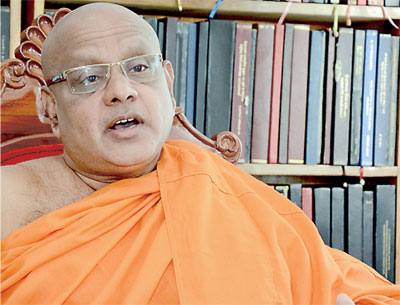Reply To:
Name - Reply Comment
Last Updated : 2024-05-09 13:17:00
 With the direct involvement of Buddhist monks in the social political issues in the country, there is social discourse whether this direct involvement of monks is appropriate for Buddhism and for the monks. In this backdrop, Ven. Prof. Kotapitiye Rahula Thera, the Director of Postgraduate Institute of Pali and Buddhist Studies - University of Kelaniya, spoke to the and shared the following views regarding the role of the Buddhist monks within society.
With the direct involvement of Buddhist monks in the social political issues in the country, there is social discourse whether this direct involvement of monks is appropriate for Buddhism and for the monks. In this backdrop, Ven. Prof. Kotapitiye Rahula Thera, the Director of Postgraduate Institute of Pali and Buddhist Studies - University of Kelaniya, spoke to the and shared the following views regarding the role of the Buddhist monks within society..jpg) What has the Buddha taught about the role of a Bhikkhu in society?
What has the Buddha taught about the role of a Bhikkhu in society?(1)(9).jpg)
(1)(9).jpg)
 scholar monks who were responsible for creating issues. When these scholars were increased they tried to interpret the Dharma in accordance with their knowledge. This situation is apparent at present. Some people can be seen on media attempting to interpret the Dhamma in their own way. They give wrong interpretation to the society. Some monks were of the view that they were well-aware of all spheres in the society. The fourth factor for the deteriorating of the Sasana was that persons who were entering the Sasana to get petty advantages.
scholar monks who were responsible for creating issues. When these scholars were increased they tried to interpret the Dharma in accordance with their knowledge. This situation is apparent at present. Some people can be seen on media attempting to interpret the Dhamma in their own way. They give wrong interpretation to the society. Some monks were of the view that they were well-aware of all spheres in the society. The fourth factor for the deteriorating of the Sasana was that persons who were entering the Sasana to get petty advantages..jpg) Is it suitable for a Buddhist monk to engage in politics in accordance to Buddha’s teachings?
Is it suitable for a Buddhist monk to engage in politics in accordance to Buddha’s teachings?.jpg) The Bhikkhus, who actively involved in social politics, claimed that they were compelled to do politics since the laymen who entered politics did not take adequate measures to safeguard Buddhism. What is wrong with this argument put forward by politico Bhikkhus?
The Bhikkhus, who actively involved in social politics, claimed that they were compelled to do politics since the laymen who entered politics did not take adequate measures to safeguard Buddhism. What is wrong with this argument put forward by politico Bhikkhus?(1)(9).jpg)
(1)(9).jpg)
.jpg) How do you see the recent trend of Buddhist monks’ behaviour at protest campaigns on the streets?
How do you see the recent trend of Buddhist monks’ behaviour at protest campaigns on the streets?.jpg) Some monks argue that the prime responsibility of a Buddhist monk is to work to safeguard the nation and religion. Is it correct to say that a prime duty of a Buddhist monk is to protect Sinhala Buddhist rights?
Some monks argue that the prime responsibility of a Buddhist monk is to work to safeguard the nation and religion. Is it correct to say that a prime duty of a Buddhist monk is to protect Sinhala Buddhist rights?.jpg) What kind of mechanism is put in place regarding the monk’s discipline?
What kind of mechanism is put in place regarding the monk’s discipline?(1)(9).jpg)
(1)(9).jpg)
.jpg) What are the practical difficulties a Buddhist monk face with society?
What are the practical difficulties a Buddhist monk face with society?.jpg) Politicians do not listen to Buddhist monks now though they advise them to stop some immoral activities and policies detrimental to the country as a whole?
Politicians do not listen to Buddhist monks now though they advise them to stop some immoral activities and policies detrimental to the country as a whole? implement a certain harmful policy, another group of monks would emerge to defend the government. The Sangha Community itself should be held responsibility for this unfortunate situation. The current situation would only benefit the politicians because they can do whatever they think due to the division of the Sangha Community. Earlier, the Sangha Community was the greatest challenge for the politicians.
implement a certain harmful policy, another group of monks would emerge to defend the government. The Sangha Community itself should be held responsibility for this unfortunate situation. The current situation would only benefit the politicians because they can do whatever they think due to the division of the Sangha Community. Earlier, the Sangha Community was the greatest challenge for the politicians..jpg) What are your main suggestions for the prevailing situation?
What are your main suggestions for the prevailing situation?observer Monday, 09 June 2014 10:27 PM
GREAT article! Keep the conversation going......it is time to save the Buddha Sanga Sasanaya!
vijay Tuesday, 10 June 2014 11:48 AM
A great Buddhist clergy who follows the teaching of Buddha

Add comment
Comments will be edited (grammar, spelling and slang) and authorized at the discretion of Daily Mirror online. The website also has the right not to publish selected comments.
Reply To:
Name - Reply Comment
US authorities are currently reviewing the manifest of every cargo aboard MV
On March 26, a couple arriving from Thailand was arrested with 88 live animal
According to villagers from Naula-Moragolla out of 105 families 80 can afford
Is the situation in Sri Lanka so grim that locals harbour hope that they coul